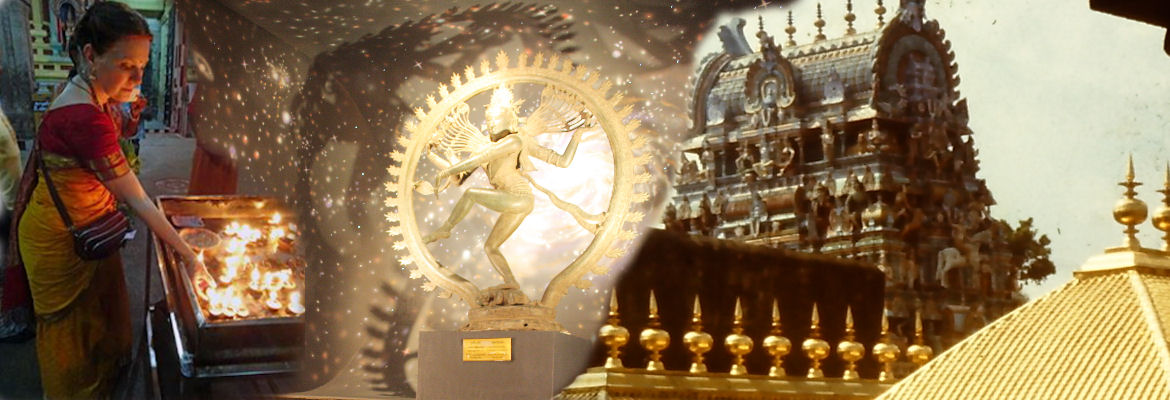Jacob Haafner was a Dutch VOC employee and traveller who lived and worked on the East coast of India for almost twenty years. After his return to Amsterdam he wrote a series of wonderful travelogues about his experiences. I am translating these into English (this is the first time) so all the world can enjoy his observations and insights. This chapter about Mahabalipuram or Mamallapuram is the fifth chapter of the second volume of his “Travels in a Palenquin” describing a journey from Bimilipatnam to Pondicherry in the years 1786 and 1788.
Chapter Five: Talajoer, Maveliewarom.
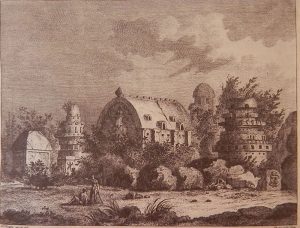 It was about three o’clock in the late afternoon when we departed from Tripalur, and a little before sundown we reached the fishermen village Talajur. It lies on the sea and had, amazingly, not suffered any damage as to the hutments; but the previous inhabitants of it, had all been killed, not one who had escaped the sword and the famine, and the few fishermen who now inhabited this village, belonged to another, located a few miles further north, which had been completely torched in the last war.
It was about three o’clock in the late afternoon when we departed from Tripalur, and a little before sundown we reached the fishermen village Talajur. It lies on the sea and had, amazingly, not suffered any damage as to the hutments; but the previous inhabitants of it, had all been killed, not one who had escaped the sword and the famine, and the few fishermen who now inhabited this village, belonged to another, located a few miles further north, which had been completely torched in the last war.
This was told to me by one of these unfortunates, while I sat on the beach and I entertained myself watching the rolling waves breaking against it. He spoke to me of his last village, about his cabin, his raft, about his nets, he had lost everything; of his wife and children, who had died of hunger; – he alone was left of his family – and he began to cry loudly.
His sad story moved me into the innermost parts of my soul; I thought of the terrible disasters that had struck the unfortunate natives of Choromandel; the horrendous scenes which I had seen and been present, played themselves again before my mind.
Fierce, gold-thirsty, cruel, treacherous foreigners come from distant lands, to spread war and destruction in these, previously blessed, nations, to sacrifice their inhabitants to sword and famine.
Great God! I cried wistfully, and folded my hands; when will peace and freedom smile again upon these innocent people? When will these gruesome tyrants once again be banished from this part of the world? How long will the poor Indian sacrifice his little resources to these insatiable robbers, and fatten them with his sweat and labor? How long, O merciful God! will they mark as their property the firstling of Nature and of the industry of the inhabitants?
While I was talking like this to myself, the sun sank behind the horizon, and gilded with her last rays still the white sand dunes. Darkness spread over the earth, and I returned to our camp, the heart filled with sad thoughts.
With the dawn we stepped again in our Palanquins. Not long after we saw the mountains of Maveliewarom, or Maveliepuram, ahead of us and around two o’clock in the afternoon we entered the valley and found ourselves nearly in the center of this large collection of miracles.
What an amazing scene for anyone who comes here for the first time! His contempt for the people of India can be ever so large and he can be heavily biased against them, but as soon as he has seen Maveliewarom, he will have to admit that these people must have had a high level of civilization. That the arts and sciences have previously experienced a flourishing and that everything we call miraculous as the pyramids of Egypt cannot be compared with the awe inspiring ruins and colossi that can be found in Maveliewarom and spread across India.
In this valley it is always teeming with all kinds of birds that have made it their home in more numbers than I’ve ever seen elsewhere. From hill to hill the cooing of the innumerable turtledoves echoed which have here their nests in the cracks of the rocks and the hollows of the ruins without being disturbed.
However great was the curiosity of mister Cockrel, I advised him, however, to postpone them until we had taken our lunch, and the sun was down somewhat; while it would increase the severe headache, of which he had complained in the morning. He remained then in the Chauderie of the village, while I climbed up one mound, and sat myself down on the top of it, while surveying the grand spectacle.
My imagination carried me back to the days of antiquity, to unknown and bygone ages when the great Joudishter held sway here, and from here send out his orders to all corners of his vast empire.
These mighty ruins, these grand monuments of time immemorial, filled my soul with mournful contemplations.
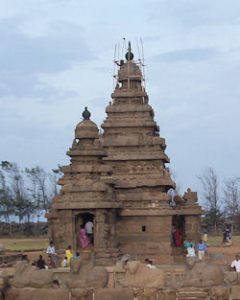 What an irrefutable proof of the futility and inconstancy of sublunary things lie in the contemplation of these great and mighty, yet now gone to naught and dilapidated city, and the memory and comparison of her previous and present state! Where is the city of the twenty gates and one hundred palaces? Where is her former glory and splendor, where are her innumerable inhabitants?
What an irrefutable proof of the futility and inconstancy of sublunary things lie in the contemplation of these great and mighty, yet now gone to naught and dilapidated city, and the memory and comparison of her previous and present state! Where is the city of the twenty gates and one hundred palaces? Where is her former glory and splendor, where are her innumerable inhabitants?
The beautiful and magnificent city of the victorious Joudishter (*Joudishter, a famous prince, one of the five sons of Pandou, the Heroes of the Mahabaroth) has decayed to a miserable little village. In small straw huts a few poor Brahmins now inhabit this place where she was once standing. This extended area is now dominated by a foreign power and the unfortunates who inhabit today groan under the slavish tyranny of the Europeans.
Nothing of this famous city remains but the awesome colossus, the sad skeleton of the former greatness!
Loneliness and deathly silence now take the place of the incessant din of innumerable crowds that used to swarm together. The songs, the celebrations, the processions and sacrifices to the Gods, have fallen silent, – the temples stand alone, surrounded with dense and impenetrable thicket. Snakes and lizards live there and the fierce viper has here her nest. From the walls hang withered vines and braiding ivy. Brown moss covers the walls; through the hollow temples now the wind whistles and where the songs and cheers echoed, one now hears the night owl.
Here, by this way, it may be, where the victorious Joudishter, sitting on his Roth (victory chariot), drawn by elephants, and surrounded by his warriors, triumphing over his enemies, returned, or to punish them, went to the Warfield. Here possibly he showed himself to his subjects, to exercise justice and to hear their complaints. Here possibly stood the heralds, proclaiming his praise, and inviting the people for public celebrations. But all the pomp of the court, all the palaces and triumphal arches are gone! Even the name of the great prince and his successors can only be found in the mysterious fabulous stories of the Mahabharata.
Is this the end of people’s labor? Must thus disappear into nothingness his works, raised by thousands of hands and with unspeakable effort and patience, thus be submerged into oblivion his actions, his glory?
O Maveliewarom! It is in your school that the vain and imperious can learn to be humble. They can learn more here than all of what is being said by philosophers and theologians on the vanity and inconstancy of terrestrial things. In this mood, my heart full of thoughts about impermanence I left the hill and I returned again to my travel companions. We took a hasty lunch, and then proceeded on our way.
I’ve often been at Maveliewarom, when I lived at Sadras, which is located about one and a half mile away from there. I have sometimes dwelled there a whole day, seen everything, studied and drawn it; but every time I saw these wonderful creations with new pleasure, with new delight and wonder. This time once again, they seemed new to me, I was so eager to examine them, as if I had never before seen them.
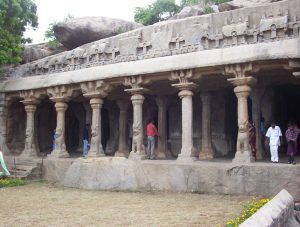 What an impressing sight are not those ancient buildings of the strangest shapes and form, whose rough and irregular order of construction are more pleasing to the eye, more instilling wonder and reverence, than most beautiful and largest palaces of our time!
What an impressing sight are not those ancient buildings of the strangest shapes and form, whose rough and irregular order of construction are more pleasing to the eye, more instilling wonder and reverence, than most beautiful and largest palaces of our time!
Amazement fills the soul, when we enter into these deep subterranean spaces, where the owls and bats buzz; these lofty vaults, chiseled deep into the mountain, with their immense columns, hewn from one and the same stone.
Nowhere in the whole world one finds in such a small area, so many buildings, hewn into and out of mountains and rocks, together, as at Maveliewarom – all the hills are covered with temples, pyramids, Chauderies and such, and hollowed out by subterranean vaults, and of one piece, and formed from the same mountain on which they are standing.
Great big rocks lie spread here and there, as if they were torn by an earthquake from the mountains; others seem to be placed as if with forethought, and ordained fit for some building or intention, because they are seen tooled in whole or in part, with statues and historic narrations.
Remarkable, among others, are seven temples, that stretch in a straight line from the shore, one behind the other, for as far as a mile or more, like a reef of rocks, deep into the sea.
Over the two farthest her waves roll away unhindered, and their tops are visible only just at a very low ebb; the others rise, the one higher than the other, above the water, and rise from the depths, to the extent that they are closer to the beach, and break the surf with a dreadful din, against their unshaped and black tops and sides.
The first or nearest of these seven temples, is still just on dry land, at the uttermost edge of the sea, and her waves stream in and out, at high tide. Also one can see, at a very low ebb, far and around, the tops of many other ruins stick out from the water, making this part of the coast very dangerous for ships; many have oftentimes been shattered against them, and the seven pagodas of Maveliewarom are known to and feared by all sailors; they can be found even noted down on the map.
I will, in the description of this place, only note a thing or two of the innumerable memorial signs and ruins, that are in there; because to describe them all at length and detailed, would fail me time and place.
Not far from the beach stands an average mountain that is worthy of all attention and observation; it serves the mariners approaching the shore or sailing by as a beacon or guide, and the curious and inquisitive finds abundant objects and substance for wonder and contemplation. When one approaches this hill or mountain from the north side, one can find such a multitude of memorials and ruins, that with the first glance one would believe to be in a fossilized city.
From the sea side, at the foot of the hill, stands a very beautiful pagoda, which, with all her columns and ornaments, is formed from one piece or only just one stone.
In this pagoda are found all around, a multitude of more than life-size statues, in their niches, together all chiseled from the same rock, as well as the image of a man, of a colossal size, with a miter on his head, which, chained by hands and feet, laying in a kind of Sarcophagus (grave) which stands in the center of the temple.
Here and there lie huge boulders, some fifteen feet high, and four times as long; only on one side filled with images in bas-relief, much larger than life, in different postures and characters: for what they served, or would have served, I can not understand.
Further on we see a great and spacious hall, deeply carved into the mountain, with three rows of columns; all together of a single piece.
This cave or excavation is according to the same plan as that of present-day Chauderies, and seems to have served for that end also. On either side of the entrance stands a row of images, which as well as the front pillars are very consumed by the sharp sea air.
What deserves further comment are the spacious and wide stairs carved in four different locations in the mountain, along which one can climb it to the top very easily.
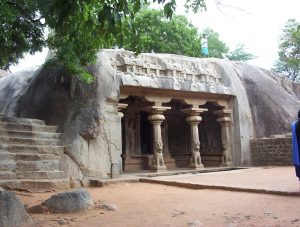 Halfway the mountain on the west side, one arrives at a temple, also hewn from one and the same rock, the walls of which are full of imagery; well executed, and in a still perfect state as not being exposed to sea air. From this temple one climbs up several flights of stairs to the top of the mountain, on which one finds a mass of broken columns and statues, covering the whole surface, finding clear proof therein that formerly there must have stood immense palaces and other buildings.
Halfway the mountain on the west side, one arrives at a temple, also hewn from one and the same rock, the walls of which are full of imagery; well executed, and in a still perfect state as not being exposed to sea air. From this temple one climbs up several flights of stairs to the top of the mountain, on which one finds a mass of broken columns and statues, covering the whole surface, finding clear proof therein that formerly there must have stood immense palaces and other buildings.
From there going down to the south side of the mountain, along staircases, which, from the top down, are carved into the rock, one arrives again at another cave sculptured deep into the mountain, supported by a mass of columns. From the altars that are in there, as also from the statues of a multitude of gods and goddesses, one would say that this cave would have been appropriate towards a religious purpose. One sees among others Bieshn as a colossal figure, lying in a kind of bed, his pillow is an excited snake; the whole so well like all the other images hewn from the cliff, and attached to it still from below.
In this mountain as well as in all the other mountains and hills that form this valley, one finds a multitude of such temples and ruins; as well as caves and halls carved deep into the rock; Some of these have a spacious entrance and are adorned with beautiful imagery.
Possibly one would find still many commendable things in these subterranean halls, books and writings, which are hidden in there, and which could offer an explanation of the history of these almost forgotten centuries; it would be worth while to examine these vaults carefully, and to penetrate into them; I have, when I was still in Sadras, many times felt the desire, if it were not because of snakes and other poisonous animals, that could dwell there, I was withheld thereof.
How marvelous these works may be, however, they are surpassed by many others that are seen from afar on several hills, but which because of their steepness, and the thick undergrowth with which they are overgrown, the living place of toxic and ravenous beast, are not to be climbed.
On the branched crown of one such a steep, and utterly unapproachable high rock, stands a temple, for all means and purposes still intact. The Bramins say that one could climb to the very top along stairs from inside this rock; but from time immemorial no one would venture into there.
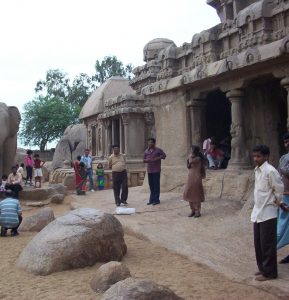 Wholly outside the village on the south side, there are five temples of varying size and shape, and just a few steps separated from one another; they are carved from one and the same mountain, and thus literally all five from one piece. The roof of the middle and largest one is round or domed, and has a great crack, it is said to have been caused by lightning. All these five temples are full of allegorical figures and idols, which, as well as the pillars that support the roof, all belong to the same rock.
Wholly outside the village on the south side, there are five temples of varying size and shape, and just a few steps separated from one another; they are carved from one and the same mountain, and thus literally all five from one piece. The roof of the middle and largest one is round or domed, and has a great crack, it is said to have been caused by lightning. All these five temples are full of allegorical figures and idols, which, as well as the pillars that support the roof, all belong to the same rock.
Near these temples are several animals such as elephants, lions, etc. larger than life-size, which are also carved out of the same mountain.
In one word, most of these ruins, as far as the temples are concerned, are all carved out of the solid rock, and thus formed of one piece; However, there are also several, that are build out of square large bluestone blocks, these stones are smooth inside, and rest from their own weight on one another without any joining of lime or cement.
One should be surprised when one considers what a power has been necessary to bring such immense blocks to a height of 80 to 100 and more feet, with what tools they could do it, is unknown to me and impossible to understand; but these piled up rocks, if I may so call it, prove satisfactorily that the Indians of that time, knew the forces of mechanics, even better than we do today, and therefore they must consequently have reached a high degree of science.
In many of these memorials and ruins, one finds inscriptions; but the characters are utterly unknown, and among the most learned Pundits, has as yet nobody come forward, who could read them. They differ altogether from those of the Samscrit, Nagarie, Grindam, or other ancient Indian languages.
The city must have been of an extraordinary size, if one counts, that she covered not only the whole valley, which is three miles in the round, but still above also the easily twice as large sprawling region, which is now covered by the waves.
When, and in what manner, the sea made this infringement, either by hurricane, or gradually, – is completely unknown.
The high antiquity of this city, is lost in the dark ages; its origin is hidden under the veil of fables and of the time of her destruction nothing at all is known.
One can find only in the famous Epic, the Mahabaroth, some dark notes made of it, as of her distance from the mouth of the Ganges, and the hero Joudishter, which would have ruled there – which is also likely.
Possibly this same Joudishter was her founder, who gave her, in honor of his friend and protector, Kishna, the name of Mahapilliepoeram, or the City of the great Tiger (*) ; Pillie signifies, in the Nagaric language, Tiger. Some will that this town derives her name from Mavalie, signifying the Samscrit a Peacock; others again from the King or Raja Bali, after whom she would have been named Mahabalipuram, or the city of the great Bali. But the latter is not likely, as this prince reigned in Ajodhia, the present Ude.
(*) Bieshn in his outar or metamorphosis as Kishna, is called in the Samscrit Mahabhag, or the great tiger. Outer actually means, come into the world.
In general there lies on these relics and antiquities, which one find spread in abundance over Orixa, Choromandel, Ceylon, Bengal, Hindustan, Malabar, and other countries, one impenetrable darkness, and the histories, who mention of it, are mostly fabulous and insufficient.
Meantime these antiquities show sufficiently/amply, to which a lofty level of science and civilization the Indians of that time had risen, and one must generate very venerating thoughts of greatness and power of these peoples, who have been able to undertake and finish such colossal endeavors.
The all destructive time, and even more than that, the destructive hand of man, has, so far, been able to accomplish nothing; the building form itself, has insured them against all devastation. Centuries they have already been standing, and they may for last ages more; and as for the subterranean halls and caves, even these will probably not, except with the world, or the mountains where they are dug or chiseled, be destroyed.
It was getting dark already when we returned from our walking, or rather clambering over rocks and hills; we had scarcely seen a twentieth part of the ruins; in deed, to investigate everything detailly, one would need a week and longer.
The Chauderie, in which we had pitched our camp, and which had seemed to us the best, was with some others more just outside the village, and was totally empty, outside of us there was no one in it, any more than in one of the others.
The reason for this is that no traveler or pilgrim lightly will spend the night at Maveliewarom, because of the wild animals, as Tigers and Jackals, even Hyenas, who haunt these with impenetrable thicket and brushwood-covered hills and mountains, and in the ruins and monuments.
Our Coolies had, so it seemed, little mood to proceed again on the journey; we would still not have been able to reach Sadras before midnight, also we were not provided with torches, and I besides I had things to do in that place, and wanted very much to arrive by day; So we were necessitated to spend the night at Mavelievalom. The Brahmins of this village advised us to beware of the wildlife, had it happened, they said that travelers were taken by tigers from the Chauderies. And not long ago, one of the villagers had been killed by one of these animals.
So we decided to keep watch in turn. I ordered two large fires to be made for that portion of the Chauderie where we had made our camp, and enough wood to feed them during the night.
The Coolies were, according to their habit, gone to sleep immediately after dinner; my travel buddy and I remained up until eleven o’clock, with a bowl of punch; where after he also went to rest.
I had the first watch, until two hours after midnight; a few Coolies kept me company, and, after having loaded my gun loaded with a bullet, I lit a cigar, and sat down on the steps of the Chauderie.
A black night lay over the whole valley. I saw no other light than that of the glowworms, which hovered over the bushes, the deadly stillness, that reigned around us, was only disturbed by the dismal howling of jackals, who at intervals answered each other troop by troop, from hill to hill, and by the night owls who had left their living places in the clefts of rocks, and in the dark ruins, now and then sounded their mournful screech.
An involuntary shudder seized me when I beheld this frightening loneliness, and the thoughts of impermanence, rose up in my soul. I was despondent and melancholy – and the life of men lost all its charm for me.
Is it possible, I said to myself, that in this wilderness, now inhabited only by some poor Bramins (*), so great and wonderful city prospered? That it was the seat of a powerful kingdom? that a lively crowd previously occupied this desolate region?
(*) The inhabitant of Maveliewarom are mostly all Braminen.
Great God! What a striking picture of the instability of the sublunar things presents itself to the thoughtful man.
In this vast valley, where now reigns the silence of the grave, reverberated previously the din of arts and crafts, and the cries and calls of the workers; from the beautiful buildings and palaces, whose ruins and fallen columns lie scattered everywhere, joyful cheers sounded of feasts and banquets; to these majestic temples the people flowed as a stream, to sacrifice to the gods and to pour out their prayers at the altars; with loud jubilance the idols were ushered through the wide gates of pagodas, countless worshipers followed the procession; thousand torches reflected their light against the hills, and the noise of instruments rustled between the gorges of the mountains. How it formerly swarmed here of people who brought together pursuits, needs and entertainment and entertainment, and how today – how empty! how terribly empty!
Where is this mighty population? where is the fame, the glory and brilliance of this famous city? the mighty heroes, who had settled here their throne? They have disappeared, unto the shadow of remembrance.
This gigantic ruins, formerly the palaces of the great, have now become the dwelling of wild beasts, poisonous vermin now houses in the sanctum of the Gods! – It is thus that Nations are destroyed! – Thus must eventually, in the course of time, the rich, now elevated to the pinnacle of glory, come to not, the mighty nations, who now rise so gloriously, will once disappear from the earth like chaff, nothing but the faint memory that they once existed, will remain in the uncertain history.
The war, which has turned upside down so many mighty realms, destroyed so many large and famous cities, had probably also turned Maveliewarom into a mess, and I cursed by myself those who had caused this, and who, to gratify his gold thirst or insatiable ambition, had brought devastation and disaster upon this city and its inhabitants.
I brought back to my mind again the horrors of war, of which I had been an eyewitness, and fell into a deep reverie, from which I was suddenly aroused by the dreadful roar of a tiger, accompanied by the howling of jackals, answered by others, a little distance away, the sound seemed no twenty steps away from us, and came from the other side of the Chauderie.
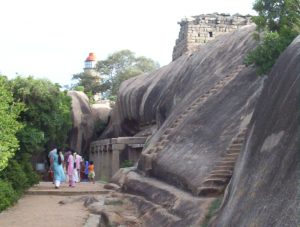 The two Coolies, who had the watch with me, and who had fallen asleep leaning with their backs against the pillars of the Chauderie, while I was immersed in thought, jumped up in shock. The Lord Cockrel even was awakened by it, and jumped anxious from his Palanquin.
The two Coolies, who had the watch with me, and who had fallen asleep leaning with their backs against the pillars of the Chauderie, while I was immersed in thought, jumped up in shock. The Lord Cockrel even was awakened by it, and jumped anxious from his Palanquin.
I hurriedly took my rifle, the two coolies each took a burning wood in the hand, and we walked to the side of the Chauderie, where we had heard the roar, but saw nothing. A few steps further was thicket, likely that these animals were hidden in it, and laid in wait for us; I shot in it, in order to expel them, in case they were in it.
All the Coolies awoke, startled by the blow, not knowing what it meant, I assured them immediately, and they went to sleep again. But I and mister Cockrel decided to stay up, and await the day. It was one hour after midnight, and we passed the time with smoking and talking.
How good was it that we had made fire, and stood guard! We now saw clearly that what the Bramins had told us about tigers was true; it could have, if we had not been on our guard, cost possibly the life of one of our people.
When the day began to break, I woke up Francisco, to cook coffee; We stayed until eight o’clock at Maveliewarom, then seated ourselves in our Palanquins – and left.
